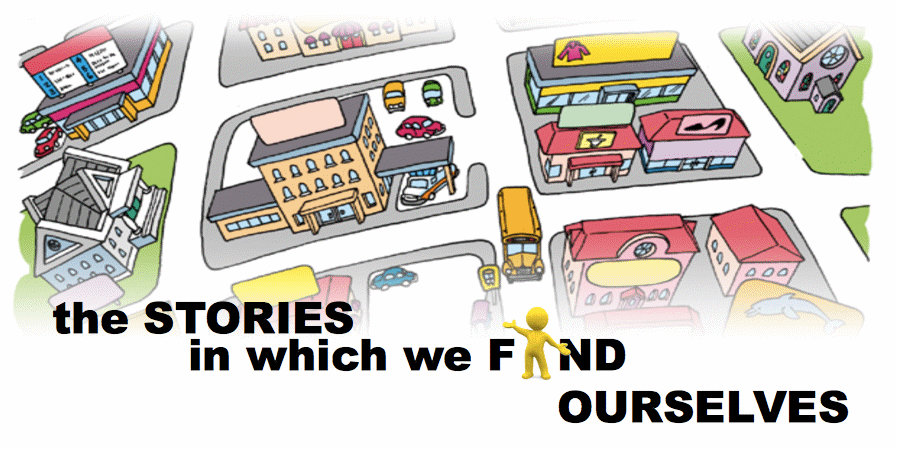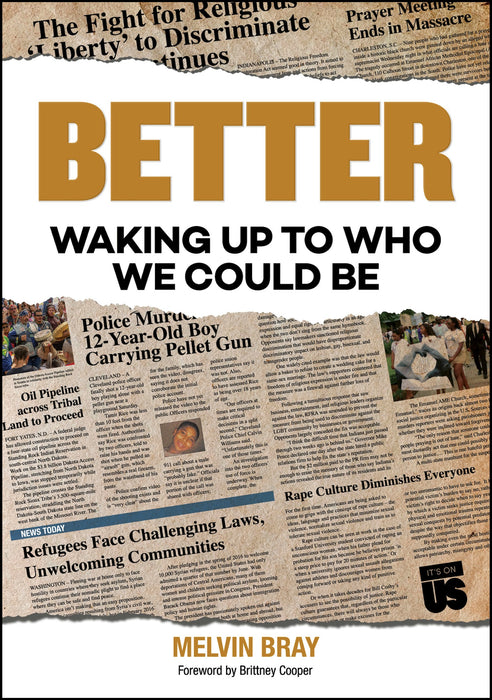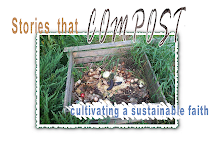Thank God, He's Not Here: An Easter Tale
Mutually composed by the SOULTRUST collective, which includes Melva Sampson, David Anderson Hooker, Ronnie Galvin, Stephen Lewis, Michael Wright, and Melvin Bray
The elderly woman made her way painstakingly down the path through the dark wood. The sun had not yet risen, teetering on the edge of now and infinite past and future. All three seemed to meet in this moment so pregnant with promise."I [tell you a] beautiful mystery, my friends. Trees become seeds, that then become trees, that bear their own fruit, and others get to feast off the fruit of their spirits."
She had labored this way many times before, each step as familiar as the dew that moisturized her bronze leathery feet along her path. "How beautiful on the hills are the feet of her who brings good news," Oya whispered to me in the softness of a breeze.
 |
| In her Easter best. |
There's so much I don't know. Like, I was never quite certain whether the story she told us each year on that day was her story or the story of one of her ancestors. Perhaps those are one in the same, so it may not much matter. Yet I was curious.
To guide those of us less familiar with the way through the darkness she would sing, first softly, as if trying to remember a melody twice forgotten, but with each new tree, more boldly as if her very continuance depended on getting it out, "Death could not hold you down... You are the risen king!"
We broke past the last row of what were at this point sparse trees into not a clearing, but rather the most barren assemblage of dry rock face one ever did see—crags and boulders which caught the rays of daylight and threw them like spears at our eyes. We could taste the aridness even before it came into view, a chalky film in the mouth. Coughs and sneezes filled the air. Those who had scarfs and handkerchiefs covered our mouths and noses. Our disparate band congealed and journeyed on together.
Though the ground was now more uneven, her steps were far more sure. She led us along the edge of a ravine, down to a particular ledge in front of the gaping mouth of a cave. There she invited each of us to peer into the darkness.
 |
| “Mind of My Mind” by John Jude Palencar, a visual allusion to the novel by Octavia Butler of the same name |
"Nothing," we agreed.
"Then see again," she cajoled. "Don't just look—SEE! Give your eyes time to adjust to that which enlightenment, illumination, our very sun often obscures."
There she goes again, speaking in riddles. How does light obscure? I loved it.
We all moved back to the opening. This time taking time.
"What did you SEEEEEEEE? What did you smell, taste, hear, feel?"
"Emptiness," "Loneliness," "Mustiness," "Wailing," "Loss," "Void," "Conjuring," "Promise," we rattled off in succession.
"Better! That's right. That's exactly what we saw that day, long ago, when we stopped looking at what wasn't and bothered to see what is.
"At first look, all we knew was that 'He is not here.' That's all we could say to one another.
"We had gotten up early, oh so early, wanting to arrive with the sun to do right by our dearly departed. He had been taken from us at the moment we had just started to really believe that the new world of which he spoke was possible. We—those whom society and tradition had put on the outside of all good possibilities—had surged into Jerusalem that year in celebration of a Passover that for the first time in a long time felt like it could include us. We were an Ubuntu uprising—"I am because we are; we are because I am." Then it was all stolen from us, in an instant. The wind was snatched from our lungs! We lay paralyzed, gasping for air, as they threw him in detention, beat him within an inch of life, and then hung him high enough for all to see him take his last breath, writhing in pain. 'And thus ends the world you thought possible,' the cruelest of them said, mocking us.
"So that Sunday morning when we got here, where our friend Joseph said he had laid him, and Jesus was not there—." For a moment her words failed.
Gathering herself, she continued, "I cannot tell you how much we had already grieved. How I myself had nearly drowned in a churning sea of hopelessness. How many times I had prayed Yemaya, servant of the Eternal, would take me in my grief. When she would not respond, I cried out to her darker twin, Olokun, from the depths of my despair. Neither would offer me the release for which I begged. All creation simply stood vigil, ever present with me, but leaving me to feel every bit of the pain of separation that had swallowed me.
"What would become of this kingdom... kindom... other world Jesus had called us into, without him here?
"'Why do you look for the living among the dead?' The query crashed into our collective consciousness like a battering-ram finally breaching the gates of our understanding.
 |
| Endarkenment |
"Chile," one of the aunties in crowd commiserated, "that's like when the doctors looked at my test results and saw a womb that held only death. My spouse and I took a chance on a healer who was willing to see from a future teeming with life a child yearning to be born free!" She winked at her daughter, whom they had named Frii, and smiled in deep satisfaction.
"That's right, Beloved! Even as the womb is a portal from the realm of the ancestors to this one, so too the tomb is a portal from this reality to that one. Their connection creates a continuous resurrection cycle in both realms—although it must be acknowledged some are lost to the cycle prematurely, violently, or because of lack of access to basic dignities.
"Jesus was an ancestor now, reunited with the Eternal Ancestor of us all. Body or not, whether we were given a chance to clean and dress and perform last rites or not, he was no longer of this realm, and through our entanglement with him, neither were we, not completely. The day would eventually arrive when we too would become ancestors, and we should celebrate it, even as we celebrate when those from the ancestral realm choose to be born anew back into this realm, as children. But in the meantime, we had been given a gift: to be able to see on both sides of the veil in every direction. Time for us was no longer a straight line with all our possibilities wholly contingent yet conveniently detached from what came before. Time was now a circle, in which our history, our present, and our future are all in the now."
It was then that one of the teens interjected, "But don't most shapes, Ms. Maria, not just circles, ultimately find their way back to their starting point—triangles, squares, infinities, even shapes as elaborate as the adinkra?"
A audible gasp rose up from our adhoc band. We all held our breath wondering what might happen next.
The elder let out the heartiest of laughs. "Heeeey, I guess they do, little one. So let's say, our sense of time, with each new shape it took," she winked, "began to double back on itself, spiral upward, and in so doing reveal infinite possibilities. Grounded in the realities of the present, we were able to fully acknowledge the past for all its less than idealness—every pain, every ache, every sorrow, every injustice, every opportunity missed, every responsibility now finally taken—and, at the same time, project a future no longer constrained by the limitations of that past."
We all sat dumbfounded. Every time I had heard it, year after year, I had no earthly idea what to do with it. This year, for the first time, I decided to ask.
At first, I thought she was going to ignore me, because she started back up the skirt of the ravine. But as she made her way, she continued talking slowly, between breaths, "I can't tell you what you should do, my dear. I can, however, tell you what we did. We told everybody about the future we could now see and got about the business of living it into existence.
 |
| "[She] who brings good news." |
"After our multiple different experiences at the tomb—including the chance I got to be the first one to actually see him again—we decided to just take care of each other, to be chosen family. Jesus even dropped in on us a few times to tell us how proud of us he was. Yes, when asked, we would tell those who inquired who had not been a part of Jesus' messiah campaign about the empty tomb, but that wasn't where the real action was. The real action was in refusing to return to the ways of empire—the self-interest, the rugged individualism, the greed, the exploitation of anyone weaker than ourselves. No more of that kind of communal self-hatred, that was antithetical to the Jesus Way. We were committed to his example. No one went hungry when he was around, so we weren't going to let anyone within arm's reach go hungry around us. He was our healthcare, so we provided the same level of care for each other. When, after Jesus had scared away the offering swindlers and loan sharks, the temple priests restarted the temple debtor system that had labeled us perpetual sinners, rather than try to get back in good standing with that system, we worshiped on our own, not only forgiving each others' shortcomings but, together, making up for them. Everyday, more people came to join us. Some we had never seen before."
By now we were back within the shade and shadow of the wood we had picked our way through in the dark. "I'm not sure Empire even noticed what was happening at the time. Crucifixions were a dime a dozen in those days, public entertainment. Pilate, the governor of Palestine, kept doing what he had always done. And Caesar, in Rome, could care less about us for the time being. The temple rulers aligned with empire though, upon hearing about the empty tomb, sought to pay off the guards who had first corroborated the story of Jesus' resurrection with their own telling of an encounter with an Orisha that had appeared just before break of day, flung away the stone that had been placed in front of the tomb with a wave of his hand, and told Jesus to wake up. True to the way of empire, the Roman guards took the money, of course. Some reneged on the testimony they had given, but not all. And as you know, the self-interest, individualism, greed, exploitation, and endless extraction of empire is alive and well.
"However, we never really saw it as our job to pull up all the weeds of empire. We were more focused on planting and tending the seeds of the kindom of God. We figured, if we fed and watered them enough, they would grow strong enough to crowd out the weeds and eventually bear fruit." With that, she waved her free hand at the trees all around.
 |
"I leave you with this beautiful mystery, my friends. Trees become seeds, that then become trees, that bear their own fruit, and others get to feast off the fruit of their spirits. In like manner, we become ancestors, who then become children, who themselves take on the responsibility of producing resurrection... and their progeny feast off the futures that we birth into reality. Asé?"
"Asé," we muttered in response, just as pleasantly perplexed as ever.
With that she started up the walkway toward her cottage, assuring us as she leaned heavy on her walking stick with each step, "In due time, my dears, in due time."








